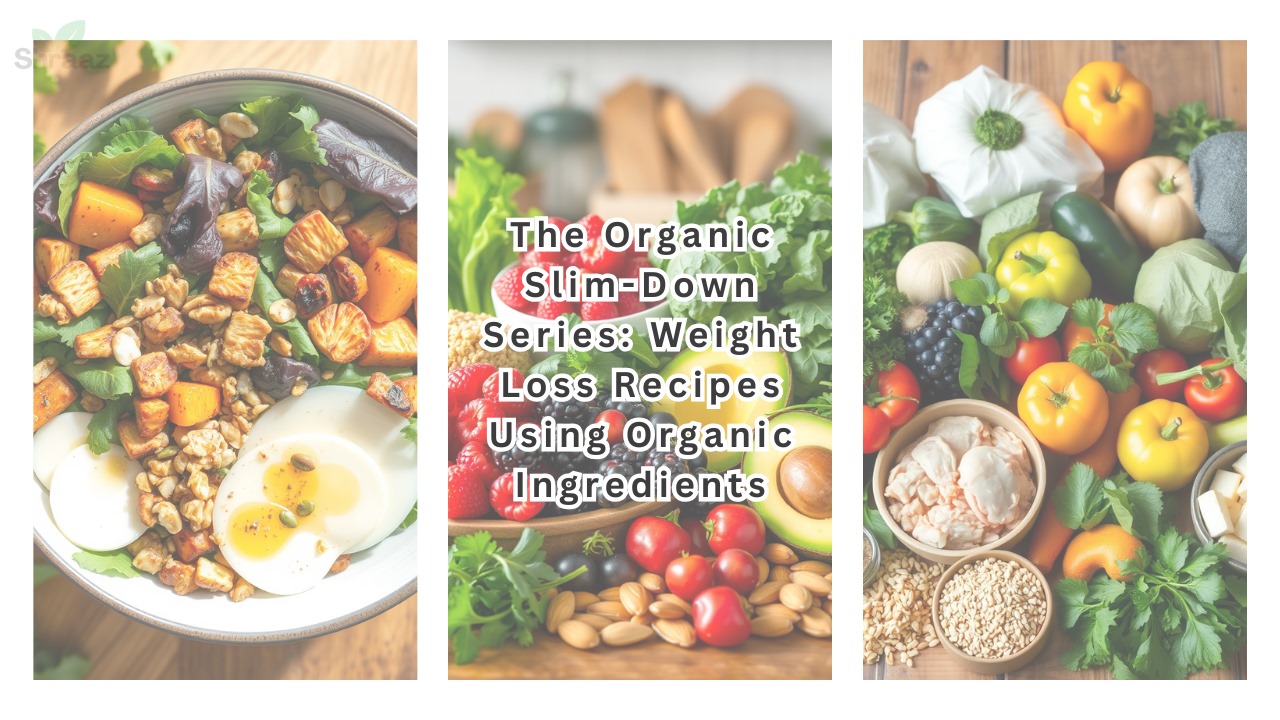What is the Organic Slim-Down Series about?
In recent years, the health and wellness movement has been steadily gaining momentum, with more people turning to natural and organic foods as a pathway to improved health. For individuals seeking weight loss, organic foods offer a significant advantage, not only because they’re free from harmful chemicals but also because they provide nutrient-dense alternatives that promote satiety and wellness. This comprehensive guide, The Organic Slim-Down Series, explores how integrating organic ingredients into your diet can aid weight loss, featuring carefully crafted recipes, key ingredients, and practical lifestyle changes that align with natural, holistic health.
Weight loss is often misunderstood as simply reducing calorie intake. However, the quality of those calories is crucial; organic foods can improve digestion, reduce inflammation, and provide energy—all of which help maintain a balanced body weight. This article will dive deep into the benefits of organic ingredients, share recipes and meal plans, highlight important weight-loss-friendly foods, and suggest tips to keep your lifestyle sustainable and effective.
Benefits of Organic Ingredients for Weight Loss
When it comes to weight loss, organic foods provide a powerful foundation. Unlike conventional foods, organic produce is grown without synthetic pesticides, fertilizers, or genetically modified organisms (GMOs). This difference not only impacts overall health but also supports weight loss by providing the body with high-quality nutrients that encourage natural metabolic processes. Here’s a closer look at why organic foods are beneficial for weight management:
Enhanced Nutrient Density
Organic foods generally contain higher levels of nutrients, especially antioxidants, which are known to support weight loss by improving overall health and energy levels. Studies have shown that organically grown fruits and vegetables can contain up to 20% more antioxidants than their non-organic counterparts, supporting cellular health and aiding metabolic function. High antioxidant levels help reduce oxidative stress, a known contributor to weight gain, especially when coupled with other lifestyle factors.
- Key Point: Opt for organic versions of nutrient-dense foods like berries, leafy greens, and nuts to get the most out of their weight-loss-promoting benefits.
Fewer Chemicals, More Natural Weight Control
One of the primary advantages of choosing organic foods is the reduced exposure to harmful pesticides and herbicides. Many chemicals used in conventional farming are endocrine disruptors, which can interfere with hormones responsible for weight regulation, such as leptin and ghrelin (hormones that control hunger and energy). Choosing organic minimizes the intake of these harmful substances, allowing your body’s natural weight control mechanisms to function more effectively.
- Fact: According to the Environmental Working Group (EWG), around 70% of conventionally grown produce contains pesticide residues. Going organic reduces this risk significantly.
Supports Digestive Health and Gut Flora
A healthy gut microbiome is essential for maintaining a balanced weight, and organic foods are a key player here. Studies have shown that the diversity and quality of gut flora are higher in people who consume organic produce, as it is free from antibiotics and preservatives that can disrupt gut bacteria. Improved digestion leads to better nutrient absorption and metabolism, which is crucial for weight management.
- Key Foods for Gut Health: Incorporate organic yogurt, kimchi, and high-fiber vegetables like organic carrots and spinach into your diet to support a healthy gut and assist in weight loss.
Reduced Inflammation and Its Link to Weight Loss
Chronic inflammation is often linked to obesity and other metabolic conditions. Organic foods are rich in anti-inflammatory compounds, which help the body maintain a balanced internal environment. Foods such as organic turmeric, ginger, and leafy greens provide antioxidants and phytonutrients that combat inflammation and promote metabolic health.
- Fact: A study published in the Journal of Medicinal Food found that organic turmeric significantly reduced inflammation markers, which are often elevated in individuals with obesity.
Check out Weight Loss Recipes Using Organic Ingredients for a detailed discussion of this topic.
Daily Recipes Featuring Organic Ingredients for Weight Loss
Incorporating organic ingredients into daily meals can be simple and delicious. Here are some well-balanced recipes that focus on high-fiber, low-calorie organic ingredients designed to support weight loss:
Breakfast Recipes
- Slimming Green Smoothie
- Ingredients:
- 1 cup organic spinach
- ½ cup organic kale
- ½ organic cucumber
- 1 small organic apple
- 1 tablespoon organic chia seeds
- 1 cup water or organic coconut water
- Instructions: Blend all ingredients until smooth. This nutrient-dense smoothie is rich in fiber, antioxidants, and hydration, all of which are excellent for weight loss.
- Ingredients:
- Fat-Burning Breakfast Bowl
- Ingredients:
- 1 cup organic Greek yogurt
- ¼ cup organic blueberries
- 1 tablespoon organic flaxseed
- 1 teaspoon organic cinnamon
- Instructions: Combine all ingredients in a bowl and mix well. This protein-packed breakfast supports satiety and provides essential fatty acids for metabolic health.
- Ingredients:
Lunch Recipes
- Zucchini Noodle Salad with Lemon-Tahini Dressing
- Ingredients:
- 1 medium organic zucchini (spiralized)
- ½ cup organic cherry tomatoes, halved
- 1 tablespoon organic tahini
- 1 tablespoon organic lemon juice
- Salt and pepper to taste
- Instructions: Toss zucchini noodles and tomatoes in a bowl. In a small bowl, whisk together tahini, lemon juice, salt, and pepper, then pour over the salad. This low-carb, nutrient-rich meal is ideal for weight loss.
- Ingredients:
- Detox Lentil Soup
- Ingredients:
- 1 cup organic lentils
- 2 cups organic vegetable broth
- 1 cup organic spinach
- 1 tablespoon organic turmeric
- Salt and pepper to taste
- Instructions: Cook lentils in vegetable broth until tender. Add spinach, turmeric, salt, and pepper. This high-fiber soup provides plant-based protein and anti-inflammatory benefits.
- Ingredients:
Dinner Recipes
- Stuffed Bell Peppers with Quinoa and Black Beans
- Ingredients:
- 4 organic bell peppers, tops cut and seeds removed
- 1 cup cooked organic quinoa
- 1 cup organic black beans
- 1 tablespoon organic cumin
- Salt and pepper to taste
- Instructions: Preheat oven to 375°F (190°C). Mix quinoa, black beans, cumin, salt, and pepper, and stuff into bell peppers. Bake for 25 minutes.
- Ingredients:
- Roasted Cauliflower and Chickpeas with Spices
- Ingredients:
- 1 cup organic cauliflower florets
- ½ cup organic chickpeas
- 1 tablespoon organic olive oil
- 1 teaspoon organic paprika
- Instructions: Preheat oven to 400°F (200°C). Toss cauliflower and chickpeas with olive oil and paprika. Spread on a baking sheet and roast for 20-25 minutes. This filling dinner is high in fiber and low in calories.
- Ingredients:
Check out 12 Delicious Daily Recipes with Organic Ingredients for Healthy Weight Loss for more recipes.
Spotlight on Key Organic Ingredients and Their Weight-Loss Benefits
To get the most out of an organic diet for weight loss, it’s important to understand the individual benefits of specific ingredients. Each of these organic foods is known for properties that assist with fat loss, metabolic health, and overall wellness. Let’s explore the weight-loss benefits of some powerhouse organic ingredients:
Organic Apple Cider Vinegar (ACV)
Apple cider vinegar is a popular choice among those aiming for weight loss. Its acetic acid content is known to aid in digestion, regulate blood sugar, and even promote satiety, which reduces calorie intake.
- Benefits:
- Reduces Blood Sugar Spikes: Studies show that consuming vinegar before meals can significantly reduce post-meal glucose levels.
- Promotes Fullness: A study in the European Journal of Clinical Nutrition found that ACV increases feelings of fullness, helping to control appetite.
- Recipe Ideas:
- ACV Detox Drink: Mix 1-2 tablespoons of organic ACV with water, a teaspoon of organic honey, and a pinch of cinnamon.
- Salad Dressing: Combine ACV with olive oil, Dijon mustard, and herbs for a tangy, fat-burning dressing.
- Usage Tips: Always dilute ACV before consuming to avoid acidity-related digestive discomfort. Aim for 1-2 tablespoons per day.
Organic Ginger
Ginger is another excellent addition to an organic weight-loss-focused diet. Known for its warming, thermogenic properties, ginger can help increase metabolism and support digestion.
- Benefits:
- Boosts Metabolism: Ginger contains compounds like gingerol that help activate thermogenesis, leading to a slight increase in calorie burn.
- Reduces Appetite: Studies have found that ginger can help suppress appetite, making it easier to maintain a calorie deficit.
- Recipe Ideas:
- Ginger Tea: Steep fresh organic ginger slices in hot water with lemon and a dash of honey.
- Ginger-Carrot Soup: Blend cooked organic carrots and ginger with vegetable broth for a nutrient-dense, low-calorie soup.
- Cautions: Ginger can thin blood, so consult with a healthcare provider if you are on blood-thinning medication.
Organic Turmeric
Turmeric is a powerful anti-inflammatory that has been linked to fat loss and overall metabolic health, thanks to its active compound, curcumin.
- Benefits:
- Reduces Inflammation: Curcumin has strong anti-inflammatory effects that can reduce markers of chronic inflammation, often linked to obesity.
- Aids in Digestion: Turmeric stimulates bile production, which can aid in fat digestion and prevent bloating.
- Recipe Ideas:
- Golden Milk: Blend organic turmeric with warm almond milk, a pinch of black pepper (to increase curcumin absorption), and a dash of honey.
- Turmeric-Cauliflower Rice: Stir turmeric into riced cauliflower with spices and herbs for a low-calorie, filling side dish.
- Usage Tips: For better absorption, pair turmeric with black pepper or healthy fats, as these improve curcumin bioavailability.
Organic Leafy Greens (Spinach, Kale, etc.)
Organic leafy greens are a staple in weight-loss diets. Low in calories and high in fiber, they add volume to meals without adding many calories, promoting fullness and aiding digestion.
- Benefits:
- High in Fiber: Leafy greens are rich in both soluble and insoluble fiber, which aids digestion and promotes satiety.
- Nutrient-Dense: Spinach, kale, and other greens provide vitamins A, C, and K, folate, iron, and magnesium.
- Recipe Ideas:
- Green Smoothie Bowl: Blend organic spinach or kale with frozen berries, almond milk, and chia seeds for a nutrient-packed smoothie bowl.
- Sautéed Greens with Garlic: Lightly sauté spinach or kale with garlic and olive oil for a simple, nutritious side dish.
- Prep Tips: Rinse greens thoroughly and pat dry before storing them in the fridge. Add to soups, smoothies, or salads to increase vegetable intake without extra calories.
Check out Organic Ingredients and Their Weight-Loss Benefits: A Comprehensive Guide to Healthier, Sustainable Choices for more details on this topic.
Mini Challenges and Meal Plans for Organic Weight Loss
To build a sustainable routine, try these structured mini-challenges and meal plans designed for weight loss using organic ingredients. They provide a balance of healthy calories, variety, and nutrient density to keep you feeling full, energized, and committed.
3-Day Organic Detox Challenge
This short detox focuses on high-fiber, high-antioxidant organic ingredients to reset digestion and kickstart weight loss.
- Goal: Cleanse the digestive system, reduce bloating, and introduce nutrient-rich organic foods.
- Daily Meal Outline:
- Day 1: Smoothie-based day with organic fruit and vegetable blends for easy digestion.
- Day 2: Incorporate soups and salads with lean organic protein.
- Day 3: Whole foods like quinoa, leafy greens, and steamed vegetables.
- Pre-Detox Tips:
- Eliminate processed foods and sugar at least two days before starting.
- Drink plenty of water to prepare for detox.
5-Day Organic Slim-Down Plan
This meal plan offers a more gradual approach, incorporating balanced meals and snacks with organic ingredients. It’s suitable for those who want to establish lasting habits.
- Goal: Foster a steady reduction in calories and promote fullness with nutrient-dense foods.
- Meal Outline for Each Day:
- Breakfast: A high-protein smoothie or bowl with organic yogurt and berries.
- Lunch: Light salads with organic greens, healthy fat (e.g., avocado), and lean protein like organic chicken.
- Dinner: A balanced plate with complex carbs (e.g., sweet potatoes), protein, and steamed vegetables.
- Reflection Tips: Track hunger, energy levels, and any changes in digestion to learn which foods and meal timings work best for you.
Check out Mini Challenges and Meal Plans for Organic Weight Loss for a detailed discussion of this topic.
Tips for Incorporating Organic Foods into Daily Life
Switching to an organic-based diet can feel challenging at first, especially with time and budget constraints. Here are some practical strategies to make the transition easier and more sustainable:
Simple Strategies for Organic Meal Prep
- Plan Ahead: Prepare ingredients for the week, like chopping vegetables or cooking grains in bulk.
- Batch Cooking: Make double portions of recipes and store them in the freezer for easy meals on busy days.
- Rotate Recipes: Choose a few versatile ingredients like organic leafy greens, avocados, and root vegetables to mix and match for variety.
Shopping for Organic on a Budget
Buying organic doesn’t have to be expensive if you shop smart. Here’s how:
- Prioritize the Dirty Dozen: Follow the Environmental Working Group’s (EWG) Dirty Dozen list to prioritize organic for produce with the highest pesticide levels.
- Buy in Bulk: Organic staples like oats, rice, beans, and nuts are often cheaper when purchased in larger quantities.
- Local Markets: Farmers’ markets often have more affordable organic options, especially for seasonal produce.
Creating Small, Sustainable Organic Habits
Small, consistent changes are often more sustainable than major overhauls:
- Replace Conventional Staples: Start with organic versions of frequently used items, like eggs, milk, and leafy greens.
- Experiment with Organic Snacks: Swap out processed snacks for organic fruit, nuts, or homemade granola.
- Grow Your Own: If possible, start an herb garden or grow organic vegetables like tomatoes and peppers in your backyard or kitchen windowsill.
Tips on Reducing Food Waste with Organic Foods
Organic food tends to spoil faster without preservatives, so it’s essential to manage it wisely:
- Use the Freezer: Freeze organic berries, greens, and chopped vegetables to preserve freshness.
- Plan Your Meals: Only buy what you need for the week to avoid waste.
- Get Creative: Use leftover vegetables for soups, stir-fries, or smoothies to minimize waste.
Encouraging Community Engagement for Motivation and Accountability
Building a community around organic weight-loss goals can increase motivation, accountability, and enjoyment. Community engagement not only provides support but also fosters knowledge sharing, recipe inspiration, and encouragement on the journey.
Benefits of Community for Weight Loss
- Accountability: Being part of a group can help keep you on track. When others are checking in on your progress, you’re more likely to stick with healthy habits.
- Motivation and Support: Seeing others succeed and work through challenges can boost your own motivation.
- Knowledge Sharing: Community members can offer tips, recipe ideas, and organic shopping hacks.
Tips for Creating and Engaging in Online Communities
Starting a Facebook Group
A private or public Facebook group can be a great place to share experiences, ask questions, and exchange ideas.
- Post Daily Challenges: Create small, achievable tasks, such as “Eat a new organic vegetable today” or “Make a smoothie with only organic ingredients.”
- Share Success Stories: Celebrate each member’s achievements to boost morale and encourage participation.
- Host Live Sessions: Share live cooking demonstrations, Q&A sessions, or discussions on organic nutrition and health.
Joining Niche Forums and Communities
Several online forums, such as Reddit and specialized weight-loss apps, offer supportive environments for weight-loss and health goals.
- Subreddits: Communities like r/nutrition, r/organic, or r/weightlosssupport can provide valuable advice, product recommendations, and organic food insights.
- Health and Fitness Apps: Some apps like MyFitnessPal or Noom have built-in communities that allow for sharing organic weight-loss strategies and recipes.
Engaging on Instagram
Instagram is ideal for visually sharing your journey with organic foods and weight loss.
- Create a Hashtag: Develop a unique hashtag that allows people to follow and contribute to your posts, e.g., #OrganicSlimDownChallenge.
- Share Meal Preps and Recipes: Post your organic meal plans, prep sessions, and recipes to inspire others and gain followers interested in organic weight loss.
- Collaborate with Influencers: Connect with organic lifestyle or fitness influencers for collaborative content that encourages others to join in.
In-Person Meet-Ups and Accountability Partners
Connecting with people face-to-face can provide an even stronger sense of accountability and support.
- Group Workouts or Cooking Sessions: Host monthly meet-ups for group workouts or cooking classes featuring organic recipes.
- Buddy System: Find an accountability partner to check in with daily on your goals, share recipes, and track progress together.
- Local Organic Markets and Events: Plan outings to organic farmers’ markets or cooking workshops to immerse yourself further in the organic lifestyle.
Tracking Progress with the Community
Engaging with others in tracking and celebrating milestones can make a huge difference.
- Weekly Check-Ins: Post updates on the group’s progress every week, including recipe highlights and members’ achievements.
- Visual Progress Sharing: Share progress photos, meal transformations, or before-and-after stories (with permission) to celebrate accomplishments and inspire newcomers.
- Reward System: Encourage small, non-food-related rewards for milestones, such as buying a new cookbook or organic ingredient.
Conclusion
Embarking on a weight-loss journey with organic foods not only supports health but also benefits the environment, local farmers, and communities. By incorporating organic, nutrient-dense foods, adopting structured meal plans, and engaging in a supportive community, weight loss becomes a sustainable and enjoyable process.
From understanding the benefits of organic ingredients to trying out new recipes and connecting with like-minded individuals, this approach to organic weight loss aligns with both physical wellness and holistic living. Whether you’re introducing small organic habits or fully embracing an organic lifestyle, remember that consistency is key, and each choice contributes to a healthier, more balanced life.
By applying these insights and incorporating organic foods in creative ways, you’ll be well on your way to a more energized, sustainable, and healthful journey toward weight loss.
FAQ: Organic Weight Loss with Recipes
1. What are the benefits of using organic ingredients for weight loss?
Organic foods are often free from synthetic pesticides, hormones, and genetically modified organisms (GMOs), which some studies suggest could disrupt metabolic processes. Additionally, organic produce tends to have a higher nutrient density, supporting a more balanced diet, which can be beneficial for weight loss.
2. Do organic foods really help with weight loss?
Yes, organic foods can be beneficial for weight loss when combined with a balanced diet and active lifestyle. Organic ingredients typically contain fewer additives, preservatives, and artificial sweeteners, which can lead to healthier eating patterns and better digestion, aiding in weight loss.
3. Are organic foods more expensive, and is it worth it?
Organic foods can be more expensive than conventional options due to higher production costs, but many people find the benefits—fewer pesticides, better environmental impact, and higher nutrient density—worth the investment. Look for seasonal produce, local markets, and bulk options to make organic eating more affordable.
4. Can I lose weight just by switching to organic ingredients, without changing my portion sizes?
Switching to organic can support weight loss, but it’s essential to maintain balanced portion sizes. Organic foods alone won’t necessarily reduce calorie intake; combining organic eating with portion control and mindful eating practices can enhance weight-loss results.
5. What are some essential organic ingredients for weight loss?
Key organic ingredients for weight loss include leafy greens (like kale and spinach), whole grains (such as quinoa and oats), lean proteins (like chicken or tofu), and healthy fats (such as avocados and nuts). These foods are nutrient-dense, filling, and can support sustained energy levels.
6. How can I incorporate organic foods into my diet without it becoming repetitive?
Try incorporating a variety of seasonal organic produce, experimenting with different recipes, and using organic spices and herbs to add flavor. Meal prep with different themes each week—such as Mediterranean, Asian-inspired, or smoothie bowls—can also help keep meals interesting.
7. Are organic snacks good for weight loss?
Some organic snacks, like raw nuts, seeds, and fruit, can support weight loss by providing nutrients and helping you feel fuller for longer. However, processed organic snacks can still be high in sugar and calories, so it’s important to choose wisely.
8. Is it better to buy all organic foods or focus on specific ones?
If you’re on a budget, prioritize organic options for produce that typically has higher pesticide residue (like strawberries, spinach, apples, and grapes). Known as the “Dirty Dozen,” these items are more beneficial to buy organic, while other foods, like avocados and sweet corn, generally have lower pesticide residues.
9. How can I stay motivated to stick to organic eating for weight loss?
Consider joining a community or finding an accountability partner to share recipes, challenges, and progress. Tracking your results and experimenting with new organic foods and recipes can also keep things exciting. Engaging in local events, like farmers’ markets, can help make the journey enjoyable and sustainable.
10. Can I follow an organic meal plan on a busy schedule?
Yes, meal prepping with organic ingredients can actually save time during the week. Choose simple recipes, batch cook, and store meals in individual containers. Smoothies, salads, and overnight oats are excellent time-saving organic options.
11. Are organic foods always healthier for weight loss than non-organic?
Not always. Organic versions of sugary or processed foods, like chips or cookies, may still be high in calories and sugar. It’s essential to focus on whole, unprocessed organic foods that are naturally nutrient-dense to get the best results for weight loss.
12. How do I handle organic food cravings without sabotaging my weight-loss goals?
When cravings hit, opt for healthier organic alternatives. If you’re craving something sweet, try a fruit-based smoothie. For something savory, roasted chickpeas or homemade organic kale chips can satisfy those cravings without the excess calories.




